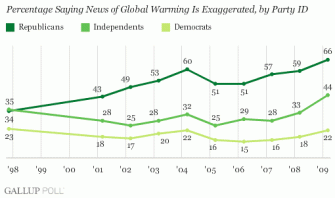Gallup: Belief in Climate Change Exaggeration at Record High

A Gallup survey report released yesterday finds that a record 41% of Americans–and 66% of Republicans–now say that news reports of climate change are exaggerated. I first spotted this troubling trend in a 2007 paper analyzing twenty years of public opinion about climate change. This latest survey reinforces my fear that climate advocates have fallen into a dangerous communication trap.
At the root of this growing perception is something I blogged about earlier this week: As long as science is communicated as the principal reason compelling policy action–and this “compelling” science dramatized by a focus on severe environmental impacts such as hurricanes–the message will either fall on passive ears and/or be easily countered as “global warming alarmism.”
Here’s how I describe the communication trap in a recent paper published at the journal Environment, using Al Gore’s An Inconvenient Truth and similarly framed news coverage as a lead example:
One of the unintended consequences of this line of communication is that it plays into the hands of climate skeptics and further reinforces the partisan divide in climate change perceptions. Andrew Revkin, who has covered climate change for nearly 20 years for the New York Times, argues these claims are effectively countered by critics, such as Inhofe, as liberal “alarmism,” since the error bars of uncertainty for each of the climate impacts are much wider than the general link between human activities and global warming.32 These challenges, which are easier when the target of ridicule is a former political figure such as Gore, quickly reactivate a focus on scientific uncertainty and the heuristic of partisanship. In addition, the public is likely to translate these appeals to fear into a sense of fatalism, especially if this information is not accompanied by specific recommendations about how they can respond to the threats.33
Revkin and others worry that the news media has moved from an earlier era of false balance to a new phase of overdramatization, one that skeptics can easily exploit to dismiss climate change as a problem.34 Polls suggest that the public has picked up on critiques of the media by conservatives, likely filtering this information through their preferred partisan lens and their belief in liberal media bias. Such filtering results in Republicans who not only discount the climate change problem but who also agree that the mainstream news media is exaggerating its severity.35
This of course was the central argument that Revkin made two weeks ago in his news analysis headlined: “In Climate Debate, Exaggeration Is a Pitfall.” Literal minded bloggers and Gore enthusiasts attacked Revkin for engaging in “false balance,” but they appeared to miss the focus of his analysis, which he succinctly re-stated in a blog post titled “Gore, Will, Climate and Complexity”:
With the battle shifting again to Congress — where arguments will include a combination of uncertain science and subjective economics — the potential for hyperbole is rising. Every time an overstatement is exposed, it threatens to further disengage people who are already either doubtful or misinformed.
So just how easy is it for disengaged audiences to re-interpret the science-compels-action message, especially when it is framed in the context of looming environmental catastrophe? Watch the clip below from Glen Beck’s program formerly on CNN’s Headline News, a segment that ran during last year’s Heartland Institute “climate swindle” conference in New York.
This same script continues to play out over and over again on talk radio, conservative cable news, and among respected Republican opinion leaders. Notice the anger and the humor that Beck expertly conveys to open his segment. Then notice the narrative he weaves together with this emotion: The UN, liberals, and the elite media are censoring rival scientific evidence on climate change. In fact, to lend further ideological resonance to his narrative, Beck portrays Gore as the figurehead and lead voice of scientific consensus. He then compares Gore’s claims to the opinions of two distinguished sounding contrarians, a Harvard physicist and British-accented scientist no less!
If science, as a “first premise,” continues to be the focal point of calls to action on climate change, the public will remain immobilized. There needs to be a second premise effectively communicated, a values-based and normative frame that is adapted to the background of different segments of the public–especially the Republican base. These frames as I describe in the Environment paper include a focus on energy innovation, the shared values between Evangelicals and environmental advocates, and the public health implications of climate change.




